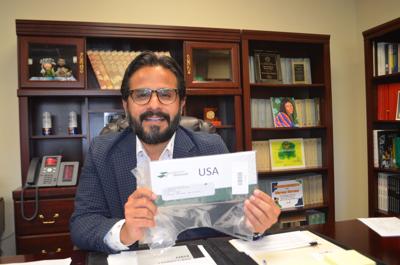
Marco Moreno Báez, consul general for Mexico in Nogales, Arizona, holds up an envelope that contains the new Tarjeta Finabien. (César Barrón / CALÓ News)
Nogales, Arizona – Mexican nationals living in the United States have a new option to send money to Mexico with the Financiera del Bienestar (Finabien) card, managed by the Mexican government. It's cheaper than other options on the market and is easily accessible.
This new option was announced by Mexican President Claudia Sheinbaum at her morning press conference on July 18. Also present was Rocío Mejía Flores, CEO of Finabien, who presented the card as the best alternative for sending remittances from the U.S. to Mexico.
The goal is for Mexicans in the United States to avoid paying the 1% tax starting January 1, 2026.
The tax was agreed upon when H.R. 1, dubbed the “One Big Beautiful Bill" on July 4, a package that, in addition to providing billions of additional dollars to strengthen immigration and border measures currently being implemented by the president, also affects millions of Americans who depend on government-funded health insurance and other government-provided social services.
Trump had proposed a 5% tax on all remittances sent to another country at the beginning of his administration. This figure has been reduced, and the new law now stipulates that, starting next year, non U.S. citizens will be required to pay a 1% tax.
According to the Center for Global Development, Mexico is the country that will be most affected by this tax. "As expected, we found that Mexico has the most to lose in absolute terms: more than $1.5 billion a year," the center detailed in a report.
Last May, the Mexican government announced on its social media that in 2024, remittances in Mexico would exceed $64 billion, representing 3.5 percent of the gross domestic product, with 99.1 percent of the total sent via electronic transfer.
In some regions of the country, they represent more than 20 percent of family income, the government indicated, which highlights the crucial role Mexicans in the U.S. play in the Mexican economy.
With this new option, the Mexican government aims to facilitate the rapid transfer of remittances without adding this tax to the expenses of Mexicans living in the U.S.
“The Finabien card allows people here in the United States not only to send money to Mexico, but also at a very low rate of $2.99 per transfer… Some might say that there are companies that do it for free, but the exchange rate they use is much higher than Finabien,” said Marco Moreno Báez, Mexican Consul General in Nogales, Arizona, in an interview with CALÓ News.
How to obtain your Finabien card
The card can be obtained quickly at any of the 53 Mexican consulates in the United States, a process that takes a maximum of 10 minutes and is free of charge, he explained.
You can also apply online at https://tarjetafinabien.com/us/
The requirements are simple, said Moreno Báez. You'll need:
An ID, which can be a voter registration card, consular registration card, passport or driver's license;
a valid address in the United States;
an email address;
and a cell phone number.
Once the card is obtained, it is activated online at the Finabien website https://tarjetafinabien.com/us/ and functions much like a regular bank card and checking account.
The account can be used to receive direct deposit pay from their workplace. The beneficiary can also deposit checks and cash as needed.
Moreno Báez added that deposits can be made to the card at 150,000 establishments, including Walgreens, Walmart, CVS Pharmacies, 7-Eleven, Dollar Tree, Safeway and many others. Since it's a Visa card, it can also be used to make purchases.
The maximum balance allowed in the account is $20,000, which includes all cash charges and direct deposits. It allows up to $2,500 per transaction when transferring to another Finabien card.
Beneficiaries can also download the app to quickly send money to Mexico, the consul explained.
Finabien, the company that manages the application and account, “is a Mexican state-owned company. It's not a for-profit entity; it's not seeking profit, but rather it's a service to provide certainty to Mexicans in the United States and their families in Mexico," said the consul.
César Barrón is an independent reporter covering the transnational communities of Ambos Nogales. He has over 20 years of experience covering the Sonoran communities.














(0) comments
Welcome to the discussion.
Log In
Keep it Clean. Please avoid obscene, vulgar, lewd, racist or sexually-oriented language.
PLEASE TURN OFF YOUR CAPS LOCK.
Don't Threaten. Threats of harming another person will not be tolerated.
Be Truthful. Don't knowingly lie about anyone or anything.
Be Nice. No racism, sexism or any sort of -ism that is degrading to another person.
Be Proactive. Use the 'Report' link on each comment to let us know of abusive posts.
Share with Us. We'd love to hear eyewitness accounts, the history behind an article.